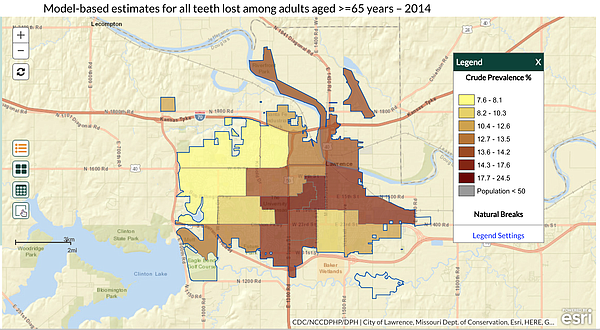Senior Oral Health – Why It Matters

Many components of the health care system — often including patients themselves — look straight past patients’ teeth and down their throats, rather than addressing oral health needs.
Medicare is no different. Original Medicare with no supplementary medigap plan, the insurance that covers roughly 427,200 seniors in Kansas, offers no preventive or restorative dental coverage, nor does it cover dentures.
That means a lot of seniors simply don’t get the dental care they need.
By the numbers
Medicare Advantage enrollment growth
In Douglas County, MA and other plan enrollment grew from 11 percent of total Medicare recipients in 2011 to 14 percent in 2017, according to the Centers for Medicare & Medicaid Services.
Enrollment in Medicare Advantage plans, which may offer some dental coverage but can be pricey, is growing. However, at least 86 percent of Douglas County residents on Medicare are left to fend for themselves for dental care.
A 2012 report called Elder Smiles, from the Kansas Bureau of Oral Health, surveyed 540 Kansans living in retirement facilities — including Lawrence’s Brandon Woods at Alvamar — and found that 53 percent had not been to a dentist in the past year, and not even 16 percent had dental insurance.
For the majority of seniors, any dental cleanings, exams, X-rays, fillings, dentures and other needs are paid entirely out of pocket — or they’re not done at all. The Elder Smiles survey found that cost was the biggest reason seniors hadn’t visited a dentist in the past year.
One statistic reveals a piece of the outcome. Citywide in Lawrence, 12.2 percent of adults ages 65 and older have none of their natural teeth remaining, according to the Centers for Disease Control and Prevention 500 Cities project. In two Lawrence census tracts — the one encompassing the University of Kansas campus, and the one just east of it — the numbers are quite a bit higher, at 24.5 percent and 20.5 percent, respectively. The statewide average is 14 percent; the national average is 14.9 percent.
Why it matters
“I always like to say that the mouth is the gateway to the body, and so if your mouth is not healthy and there is an infection going on in there, it is going to affect the rest of your body as well,” said Julie Branstrom, executive director of the Douglas County Dental Clinic.
Branstrom said there is a correlation between poor oral health and heart disease.
“The bacteria that is in your mouth that causes gum disease can also increase the risk of heart attack and diabetes and other things,” she said.
Pain in the mouth or missing teeth can also make it difficult to eat healthy foods, such as grains and fresh fruits and vegetables. So oftentimes, Branstrom said, those who are struggling with poor oral health will also suffer from poor nutrition.
“That’s (my dental health) what I’ve got to eat and feel good,” said Jacquie Bari, 66, of Lawrence. “Toothaches are not a good thing. Toothaches are very painful.”
‘They do fall by the wayside’
Dental needs often don’t receive as much attention as medical needs for seniors living in long-term care facilities.
“I think often they do fall by the wayside,” Branstrom said. “I think there’s a lot of turnover in staff in nursing homes and long-term care facilities, and I think that there’s probably just a lack of training and education for those staff members about the importance of oral health for elderly patients.”
Additionally, she said some patients may need help brushing their teeth or flossing, and frequently that just doesn’t happen.
“Some of them are struggling with things like arthritis or things that make it harder for them to floss their teeth or do a good job with brushing,” she said. “So, again, it’s just really important that if there’s a caregiver or somebody that can help with those kinds of things.”
Adult children of seniors could play a role, if needed, in making sure their parents are getting to a dentist regularly and getting the dental hygiene help they need, Branstrom said.
Self-care tips
Branstrom said daily brushing and flossing are important, and there are a few tools that might make it easier.
If regular floss is a problem, there are floss threaders available that basically put a little length of floss on a handle. In addition to electric toothbrushes, there are also water flossers that use a jet stream of water to wash debris out from between the gums and teeth, so all the operator has to do is aim.
“And then we really do recommend, every six months, coming in for a professional cleaning because that addresses things that just can’t be taken care of at home with your toothbrush,” Branstrom said.
Also, she said chewing xylitol gum can help combat dry mouth, which is a common side effect of medications and can contribute to tooth decay.
Insurance options
Lori Phillips, health resources coordinator at the Senior Resource Center for Douglas County, is known as the “SHICK chick” — the local Senior Health Insurance Counseling for Kansas coordinator.
She said she typically gets more inquiries about dental care than dental insurance, “because it seems like a lot of people don’t think about it in advance.” However, she said there are many options for medigap plans. There are also some stand-alone dental plans available, but they vary widely in coverage.
“I think a lot of people assume that insurance covers 100 percent of something, or ‘Certainly they’ll cover this,’ but they don’t realize if they’re only paying $15 a month for dental insurance that it’s not going to cover as much as they are hoping,” she said. “If they have trouble looking at those plans and they need help, we can help them here.”
For some, however, insurance may be more trouble and cost than it’s worth. Branstrom said she has frequently seen plans that might cover cleanings but offer no help for restorative work, for instance.
“They would just be better off to be uninsured and pay the reduced fees on our sliding scale,” she said.










Recent Comments